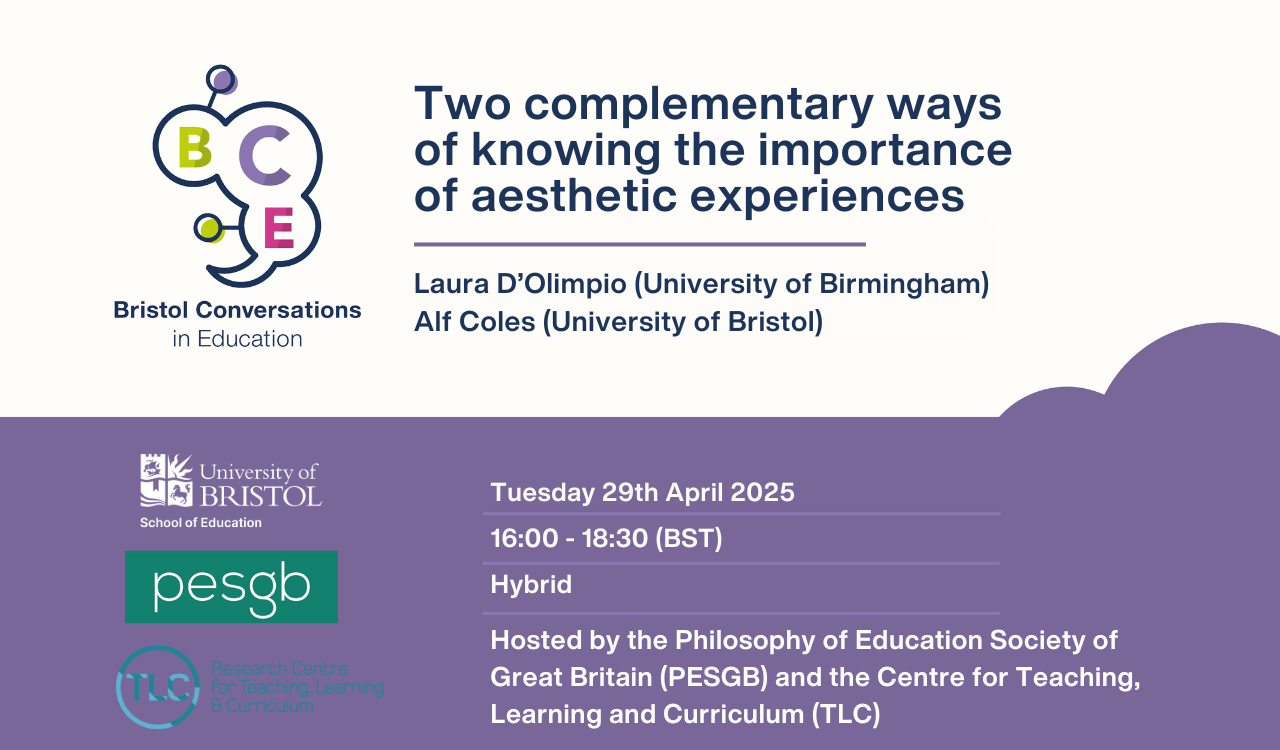Two complementary ways of knowing the importance of aesthetic experiences
Laura D'Olimpio (Associate Professor of Philosophy of Education, University of Birmingham) and Alf Coles (Professor of Mathematics Education, University of Bristol)
This is a hybrid event taking place at the School of Education, 35 Berkeley Square, BS8 1JA. Information on how to attend is found at the end of your order confirmation email.

Event information
Two complementary ways of knowing the importance of aesthetic experiences
Tuesday 29th April 2025, 16:00-18:30 (BST)
This event is part of the Philosophy of Education Society of Great Britain (PESGB) Bristol Branch Seminar series. Hosted by PESGB, TLC, and Bristol Conversations in Education.
Venue – Hybrid. Information on how to attend is found at the end of your order confirmation email.
Registration - Sign up for this event on the Eventbrite page.
About the event
This event is part of the School of Education's Bristol Conversations in Education research seminar series. These seminars are free and open to the public.
Host: Philosophy of Education Society of Great Britain (PESGB) and Centre for Teaching, Learning and Curriculum (TLC)
Speaker: Laura D'Olimpio (Associate Professor of Philosophy of Education, University of Birmingham) and Alf Coles (Professor of Mathematics Education, University of Bristol)
This event will aim to bring together two unique perspectives on the role of educators to re-humanize education. Refreshments will be provided.
“Education for flourishing must include the Arts” (D'Olimpio).
Schooling should support students to live meaningful, autonomous lives, filled with rich experiences. To the extent that people lack aesthetic experiences, their lives are impoverished; not ‘fully human’. The arts and aesthetic education are vital to such flourishing lives in that they afford bold, beautiful, moving experiences of awe, wonder and the sublime that are connected to the central human functional capability Martha Nussbaum labels Senses, Imagination, and Thought. Everyone ought to have the opportunity to learn about art, to appreciate and create art, to critique art and understand how we are connected to the culture of our society. Given that the distinctive value of art objects is that they afford aesthetic experience, it is upon this foundation that an argument ought to be mounted as to why schooling needs the arts, specialised teachers, and all students deserve aesthetic education.
"To the extent that people lack aesthetic experiences, their lives are impoverished; not ‘fully human’" (Coles, citing D'Olimpio).
In this presentation, I consider critiques of education as a humanist project. There is concern that individualistic framings of the project and aims of education can end up sustaining inequalities and the marginalization of those who are never accorded fully human status. There are also questions about human exceptionalism and how the concerns of non-human actors (other species, rivers) might be encompassed into the project of education. One possible response is to seek a communal approach to schooling. I will offer two examples of mathematics and art projects which involved collective ways of working (one relatively successful, one less so) and a conceptualization of the characteristics of such collective spaces.
Dr Laura D’Olimpio is Associate Professor of Philosophy of Education at the University of Birmingham, UK and editor of the Journal of Philosophy in Schools. Her books include Media and Moral Education: a philosophy of critical engagement (Routledge, 2018), Educating Character Through the Arts (Routledge, 2023), Short Cuts: Philosophy (Icon, 2023) and The Necessity of Aesthetic Education: the place of the arts on the curriculum (Bloomsbury, 2024). Laura regularly contributes to The Conversation, and ABC Radio National’s The Philosopher’s Zone.
Dr Alf Coles is Professor of Mathematics Education at the University of Bristol. His research began with an interest in questions of how cultures develop, in mathematics classrooms and with groups of teachers. For the last 10 years, he has been increasingly concerned with how mathematics education can respond to the climate emergency. He has been an editor of the journal “Research in Mathematics Education” and is current chair of the British Society for Research into Learning Mathematics.